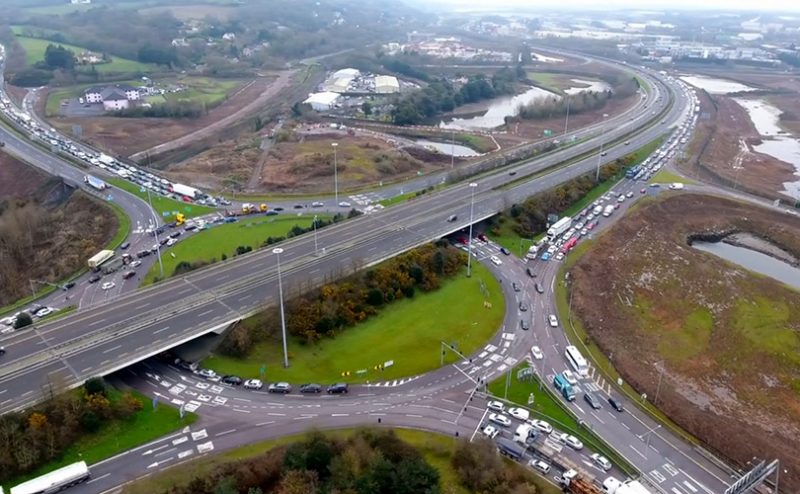
The Dunkettle Interchange, the M20, M22, N28 upgrade and the Northern Ring Road are considered critical in supporting sustainable economic development to the south of the country. Most of these are now under threat or facing interminable delays. This represents a failure on behalf of the Irish national and local political system to deliver any project outside of the greater Dublin area.
CIF Director, Conor O’Connell, stated: “The recent announcement that the Dunkettle Interchange is going back to tender could see a delay of over 10 years in a project that would reduce commuter times, provide ease of access to Port Of Cork’s new facility in Ringaskiddy, facilitate the opening up of new lands for sustainable development initiatives in Cork City centre, attract investment and improve road safety.
The Dunkettle Interchange would help “Brexit proof” the economy and facilitate residential development in our urban environments. The delay to the Dunkettle Interchange is an example of the continuing delay to many projects in the South West region. Over the last 10 years, no strategic infrastructural project has been delivered in the region that has the fastest growing population and jobs growth outside of the Dublin region; accounting for 20% of GDP. It is extraordinary that the state continuously neglects the obvious infrastructural deficits in the region.
Two things need to change immediately to prevent these issues continuing to disadvantage the regions: planning and procurement. On planning; it’s important that people can object when they are affected by development but who defends the benefit to the wider population of an entire region. A specialist court must be established with requisite expertise to make decisions quickly and efficiently on large scale projects.
On procurement, the CIF has for 15 years advocated changes to the public sector procurement system that would reduce the likelihood of delays. Delays mainly derive from issues at the design stage of projects. Changing this system would help prevent disputes, delays and the derailment of major projects.
Southern Ireland is the key to reaching the destination set out in Project Ireland 2040, which envisages that 75% of the additional 1 million population growth anticipated over the next 20 years will live and work outside Dublin. Cork has a significant track record in attracting inward investment in many areas including Pharma and Life Sciences generally as well as ICT and currently has the biggest cluster of Cyber Security companies in Western Europe. It is attracting the skilled people for these jobs but is now straining as public sector investment has not kept pace with private sector investment. We must invest in regions which are successful in attracting people and jobs. “
The National Development Plan has allocated €116 billion with a central objective being the development of Cork, Limerick, Galway, Waterford and Sligo as an economic counter-balance to Dublin. Cork is currently the construction industry leader outside of Dublin, with the highest crane activity of a regional county according to CIF’s recent National Crane Count. The count, conducted in association with AECOM Ireland, shows twelve cranes counted along the Cork City skyline in June.
While Cork did have the highest crane activity outside of Dublin, there are still ten times more cranes visible on the Dublin skyline than in Cork, with none in Limerick and four in Galway. This sort of imbalance is concerning on several fronts and demonstrates the huge challenge the Government has in its attempt to deliver on Project Ireland 2040.
“A key issue is that the private investment in Cork and the wider region is not being matched by public sector driven infrastructure, regeneration and housing investment. This is limiting Cork’s ability to attract and retain investment. This must be addressed rapidly, and we are calling on all politicians, representative bodies, and local authorities to come together to tackle the inertia in the system on September 4th at a major CIF conference in the Clayton Hotel.
As the Ryder Cup comes to Adare, it puts an impetus on the Adare By-pass as a critical project The Government must enhance the system’s ability to deliver this project and the M20, N28 and Dunkettle rather than start to deprioritise any of the other projects required to bring the southern region; the people of Cork, Limerick and the wider economy shouldn’t suffer for years solely to facilitate a sporting event. The Government must find a way to do both.” Mr O’Connell added.
Speaking about the conference, Conor O’Connell CIF’s Regional Director, said: “The Irish construction industry will be central to delivering the vision of Project Ireland 2040. The event will showcase some of the major projects that are taking place or planned in the region. It will also illustrate the importance of construction and infrastructure in the development of any region. While there are many private sector projects that are driving growth in the sector, we are particularly looking forward to an update on Public Capital investment projects.
“Infrastructure or the built environment is the skeleton, upon which all other investment relies on. A growing region requires growing investment, particularly in transportation projects”.
The Southern Construction Summit will be held on September 4th 2019 in Cork’s Clayton Hotel.